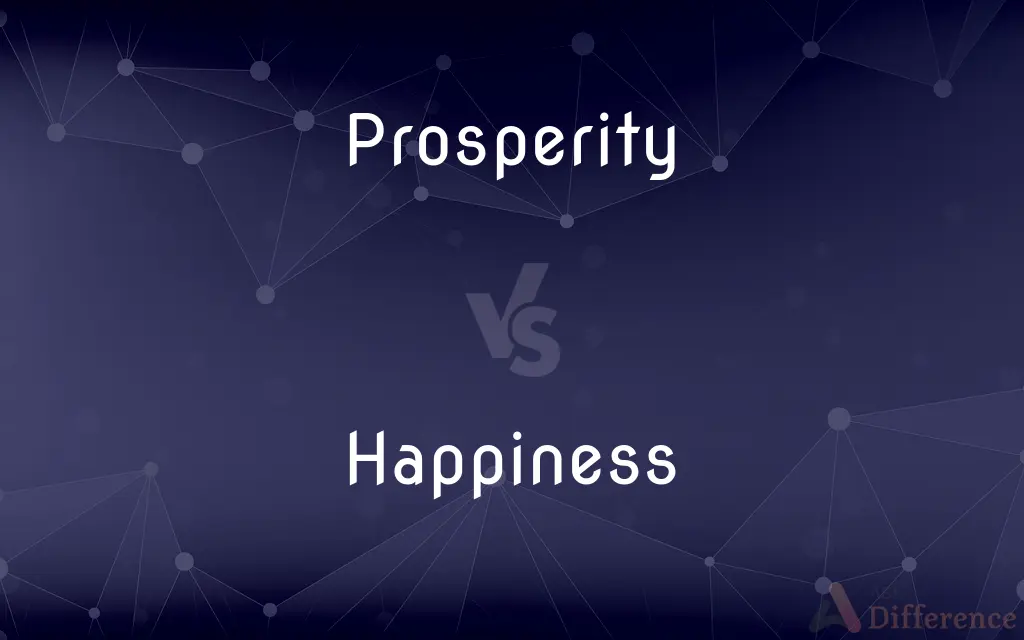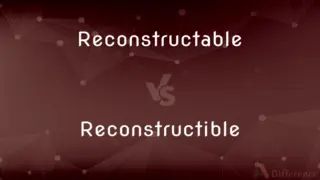Prosperity vs. Happiness — What's the Difference?
Edited by Tayyaba Rehman — By Urooj Arif — Updated on March 19, 2024
Prosperity is often associated with wealth and success, while happiness is a state of well-being and contentment.

Difference Between Prosperity and Happiness
Table of Contents
ADVERTISEMENT
Key Differences
Prosperity typically refers to financial success and the accumulation of wealth, goods, or valuable resources. It's often measured by economic indicators such as GDP, personal income, and material possessions. On the other hand, happiness is a subjective state of well-being and contentment, influenced by factors like relationships, health, personal fulfillment, and emotional well-being.
While prosperity can contribute to happiness by providing the means for comfort, security, and opportunities for personal and professional development, it is not a guarantee of happiness. Happiness often depends more on intangible factors such as emotional health, meaningful relationships, and a sense of purpose, which are not necessarily tied to material wealth.
In some cases, the pursuit of prosperity can lead to stress, anxiety, and a neglect of personal relationships and health, which can detract from overall happiness. Conversely, focusing on happiness and well-being can lead to a more fulfilling life, even if it does not result in significant material wealth.
Cultures and societies tend to value prosperity and happiness differently, with some placing a higher emphasis on material success and others prioritizing personal well-being and community happiness. This reflects a diversity of beliefs about what constitutes a good life.
The relationship between prosperity and happiness is complex, with research suggesting that beyond a certain point, additional wealth does not significantly increase happiness. This concept, known as the "Easterlin Paradox," highlights the diminishing returns of wealth on well-being, underscoring the importance of non-material factors in achieving happiness.
ADVERTISEMENT
Comparison Chart
Definition
Financial success and accumulation of wealth and resources.
A state of well-being and contentment.
Measurement
Economic indicators like GDP, income, and material possessions.
Subjective assessments of well-being and emotional health.
Contributions
Provides means for comfort, security, and opportunities.
Influenced by relationships, health, and sense of purpose.
Limitations
Not a guarantee of happiness; may lead to stress.
Not dependent on material wealth.
Cultural Emphasis
Varied; some cultures prioritize material success.
Varied; some cultures prioritize personal and community well-being.
Compare with Definitions
Prosperity
Not a guarantee of happiness.
Despite his prosperity, he felt something was missing in his life.
Happiness
Not necessarily tied to wealth.
They found happiness in simple, everyday moments.
Prosperity
Valued differently across cultures.
In some cultures, prosperity is seen as the ultimate goal.
Happiness
Can lead to a fulfilling life.
Focusing on happiness brought her a sense of peace.
Prosperity
Can provide security and comfort.
Their prosperity allowed them to travel the world.
Happiness
State of well-being.
Her happiness was contagious, brightening the room.
Prosperity
Associated with wealth.
Prosperity in the community was evident from the new businesses opening.
Happiness
Prioritized differently in societies.
Their community prioritized happiness over material wealth.
Prosperity
Measured by economic success.
His prosperity was marked by the luxury car he drove.
Happiness
Influenced by intangible factors.
His happiness stemmed from his fulfilling relationships.
Prosperity
Prosperity is the flourishing, thriving, good fortune and successful social status. Prosperity often produces profuse wealth including other factors which can be profusely wealthy in all degrees, such as happiness and health.
Happiness
The term happiness is used in the context of mental or emotional states, including positive or pleasant emotions ranging from contentment to intense joy. It is also used in the context of life satisfaction, subjective well-being, eudaimonia, flourishing and well-being.Since the 1960s, happiness research has been conducted in a wide variety of scientific disciplines, including gerontology, social psychology and positive psychology, clinical and medical research and happiness economics.
Prosperity
The condition of being prosperous.
Happiness
Enjoying, showing, or marked by pleasure, satisfaction, or joy
A happy child.
The happiest day of my life.
Prosperity
The condition of being prosperous, of having good fortune
Happiness
Cheerful; willing
Happy to help.
Prosperity
The state of being prosperous; advance or gain in anything good or desirable; successful progress in any business or enterprise; attainment of the object desired; good fortune; success; as, commercial prosperity; national prosperity.
Now prosperity begins to mellow.
Prosperities can only be enjoyed by them who fear not at all to lose them.
Happiness
Characterized by good luck
A happy sequence of events.
Prosperity
An economic state of growth with rising profits and full employment
Happiness
Being especially well-adapted; felicitous
A happy turn of phrase.
Prosperity
The condition of prospering; having good fortune
Happiness
Characterized by a spontaneous or obsessive inclination to use something. Often used in combination
Trigger-happy.
Happiness
Enthusiastic about or involved with to a disproportionate degree. Often used in combination
Money-happy.
Clothes-happy.
Happiness
(uncountable) The emotion of being happy; joy.
Happiness
Prosperity, thriving, wellbeing.
Happiness
Good luck; good fortune.
Happiness
Fortuitous elegance; unstudied grace; — used especially of language.
Happiness
Good luck; good fortune; prosperity.
All happiness bechance to thee in Milan!
Happiness
An agreeable feeling or condition of the soul arising from good fortune or propitious happening of any kind; the possession of those circumstances or that state of being which is attended with enjoyment; the state of being happy; contentment; joyful satisfaction; felicity; blessedness.
Happiness
Fortuitous elegance; unstudied grace; - used especially of language.
Some beauties yet no precepts can declare,For there's a happiness, as well as care.
O happiness! our being's end and aim!
Others in virtue place felicity,But virtue joined with riches and long life;In corporal pleasures he, and careless ease.
His overthrow heaped happiness upon him;For then, and not till then, he felt himself,And found the blessedness of being little.
Happiness
State of well-being characterized by emotions ranging from contentment to intense joy
Happiness
Emotions experienced when in a state of well-being
Common Curiosities
What are the limitations of prosperity in achieving happiness?
Prosperity may lead to stress and neglect of personal health and relationships, which can detract from happiness.
How is happiness measured?
Happiness is subjectively measured through assessments of well-being, emotional health, and satisfaction with life.
Is happiness dependent on material wealth?
No, happiness is more influenced by intangible factors like emotional health, relationships, and a sense of purpose.
How do societies view prosperity and happiness?
Societies vary, with some prioritizing material success and others emphasizing personal well-being and community happiness.
What is the Easterlin Paradox?
It suggests that beyond a certain point, additional wealth does not significantly increase happiness, highlighting the importance of non-material factors.
Can prosperity lead to happiness?
Prosperity can contribute to happiness by providing comfort and security, but it is not a guarantee of happiness.
Can focusing on happiness impact prosperity?
Yes, focusing on happiness can lead to a more balanced life, potentially improving creativity and productivity, which could indirectly influence prosperity.
Is it possible to achieve both prosperity and happiness?
Yes, it's possible to achieve both, especially when prosperity is balanced with meaningful relationships, health, and personal fulfillment.
Do all cultures value prosperity and happiness equally?
No, cultural values vary, with some cultures placing a higher emphasis on either prosperity or happiness.
How do personal values influence the pursuit of prosperity and happiness?
Personal values play a crucial role, as individuals may prioritize different aspects of life, such as career success, family, or personal growth, affecting their pursuit of prosperity and happiness.
How does the pursuit of prosperity affect personal relationships?
The pursuit of prosperity can sometimes strain personal relationships due to time commitments and stress, affecting overall happiness.
What role does security play in happiness?
Security, often provided by prosperity, can contribute to happiness by reducing stress and anxiety about basic needs.
Can societal changes influence the importance of prosperity and happiness?
Yes, societal changes, such as economic conditions and cultural shifts, can influence how prosperity and happiness are valued and achieved.
How does one's definition of prosperity and happiness evolve over time?
Definitions can evolve with life experiences, changing priorities, and deeper understandings of personal fulfillment and well-being.
What strategies can help balance the pursuit of prosperity and happiness?
Strategies include setting clear goals, maintaining healthy relationships, pursuing passions, and practicing gratitude and mindfulness.
Share Your Discovery

Previous Comparison
Syrup vs. Solution
Next Comparison
Reconstructable vs. ReconstructibleAuthor Spotlight
Written by
Urooj ArifUrooj is a skilled content writer at Ask Difference, known for her exceptional ability to simplify complex topics into engaging and informative content. With a passion for research and a flair for clear, concise writing, she consistently delivers articles that resonate with our diverse audience.
Edited by
Tayyaba RehmanTayyaba Rehman is a distinguished writer, currently serving as a primary contributor to askdifference.com. As a researcher in semantics and etymology, Tayyaba's passion for the complexity of languages and their distinctions has found a perfect home on the platform. Tayyaba delves into the intricacies of language, distinguishing between commonly confused words and phrases, thereby providing clarity for readers worldwide.














































